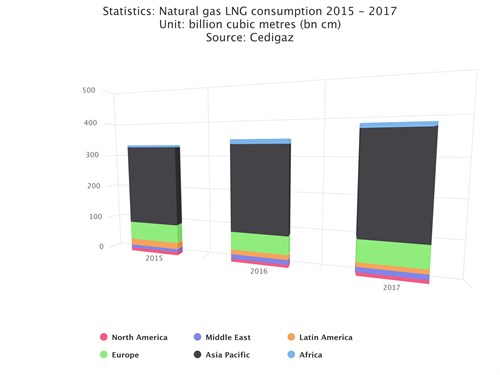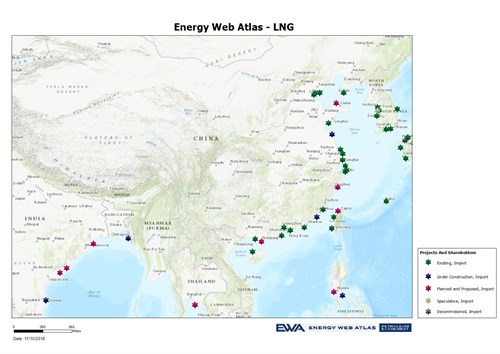China overtakes Japan as world's top natural gas importer
SINGAPORE, (Reuters) - China has overtaken Japan to become the world’s top importer of natural gas, as Beijing’s crackdown on pollution boosts its demand for the more environmentally friendly fuel, while the restart of nuclear reactors in Japan reduces its LNG imports.
 |
| China’s push to switch away from coal to natural gas is key to its rapid gas demand growth. Graphic Source: EWA |
China’s total natural gas imports over January to October this year via pipeline and as liquefied natural gas (LNG) were at 72.06 million tonnes, up a third from the same period last year, according to Reuters calculations based on General Administration of Customs data.
Japan, on the other hand, imported about 69.35 tonnes of LNG over that period, according to ship-tracking data from Refinitiv Eikon, down 17 percent for the same 10 months of 2017. Japan imports all of its gas as LNG.
China’s push to switch away from coal to natural gas is key to its rapid gas demand growth, said Edmund Siau, gas analyst with energy consultancy FGE.
“Meanwhile, nuclear reactors continue to restart in Japan, which reduces demand for gas-fired power generation and consequently LNG demand,” Siau said.
China - already the biggest importer of oil and coal - is the world’s third-biggest user of natural gas behind the United States and Russia, but it has to import around 40 percent of its total needs as domestic production can’t keep up with demand.
China still lags behind Japan on LNG imports but could overtake its North Asia neighbour in the early 2020s, FGE’s Siau said. China’s surging demand pushed it past South Korea as the world’s second-biggest LNG importer in 2017.
China last year started to move millions of households and many industrial facilities from coal to gas as part of efforts to clean its skies, sparking an unprecedented rally in overseas import orders.
Its three biggest LNG suppliers are Australia, Qatar and Malaysia. Pipeline imports come from Central Asia and Myanmar, and a pipeline connecting China to Russia is under construction.
 |
“China has become a hotbed of contracting activity, with many suppliers courting the large Chinese national oil companies as well as the emerging buyers for long-term contracts,” Siau said.
China’s natural gas demand is expected to grow about 10 percent next year, he said, while Japan’s gas demand will continue to fall. (Reporting by Jessica Jaganathan; Editing by Tom Hogue)

- RWE strengthens partnerships with ADNOC and Masdar to enhance energy security in Germany and Europe
- TotalEnergies and Mozambique announce the full restart of the $20-B Mozambique LNG project
- Five energy market trends to track in 2026, the year of the glut
- Venture Global wins LNG arbitration case brought by Spain's Repsol
- Trinity Gas Storage reaches FID on Phase II expansion



Comments